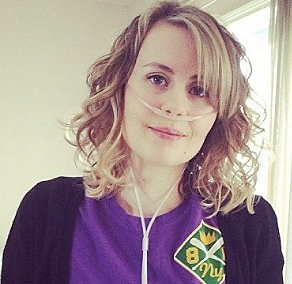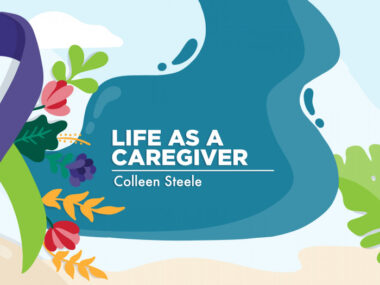PH Patients in Canada Urged to Sign Petition for Public Funding of Newer Treatments
Written by |

 Serena Lawrence, a young Canadian living with pulmonary hypertension (PH), has launched an online petition to raise public consciousness of, and draw government attention to, PH in Canada.
Serena Lawrence, a young Canadian living with pulmonary hypertension (PH), has launched an online petition to raise public consciousness of, and draw government attention to, PH in Canada.
Upon receiving her diagnosis of Stage 3-4 PH in 2013 at age 25, just three months after first showing her first symptoms, Serena says she was told she had approximately five years to live, or as many as 10 if she was lucky, and sent home with supplementary oxygen.
Educating herself about her condition, she soon learned that PH is a rare, progressive, incurable, and life-threatening blood vessel disorder that affects the lungs and heart, and develops only in 15 people out of every million. Due to its rarity, treatment options exist but are limited and expensive because of the lack of economies of scale. Serena observes in a column for Pulmonary Hypertension News that people with rare diseases like PH are sometimes referred to as “medical zebras” — a reference to an aphorism coined in the late 1940s by a University of Maryland Medical School professor, Dr. Theodore Woodward, who told his medical interns that “when you hear hoofbeats, think of horses, not zebras.” The point being that doctors should not to suspect exotic illnesses when common ones are more likely, although this is clearly not always the case.
Serena says she knew how serious PH is, but what she really wanted, indeed desperately needed, was some light at the end of the tunnel — “to hear something hopeful and encouraging. I was tired of reading over and over again the same bad news that the doctors have already given me.”
She found some glimmers in online support groups and forums, where she discovered that there were more than a few long-term PH survivors, and other exceptional people with PH who were living decent quality lives. The thought occurred to Serena: ‘why isn’t this information available?’ and led her to create ‘The PHight or Flight Project,’ initially as a blog sharing these exceptional stories. She says the project’s goal is to provide a voice to young adults facing PH in the hope of offering support, and perhaps a sense of friendship. Serena also writes a regular column called Life with PH for Pulmonary Hypertension News.
 The Pulmonary Hypertension Association of Canada (PHA Canada), a nonprofit organization working to empower Canada’s PH community through advocacy, education, research, awareness, and patient support, notes that since 1997, nine PH-specific treatments have been approved in the country and that, thanks to these advancements, many people with PH are living longer and healthier lives, with 50 percent of patients now surviving five years or longer after diagnosis. However, not all Health Canada-approved PH medications are available to patients as publicly funded treatments.
The Pulmonary Hypertension Association of Canada (PHA Canada), a nonprofit organization working to empower Canada’s PH community through advocacy, education, research, awareness, and patient support, notes that since 1997, nine PH-specific treatments have been approved in the country and that, thanks to these advancements, many people with PH are living longer and healthier lives, with 50 percent of patients now surviving five years or longer after diagnosis. However, not all Health Canada-approved PH medications are available to patients as publicly funded treatments.
 For example, Serena Lawrence cites one of the newer oral medication for pulmonary arterial hypertension (PAH), Opsumit (macitentan), which has been approved by Health Canada for some time but remains unavailable to most Canadian PAH patients due to a recent decision by the federal Canadian Agency for Drugs and Technologies in Health (CADTH) to deny public funding for the medication.
For example, Serena Lawrence cites one of the newer oral medication for pulmonary arterial hypertension (PAH), Opsumit (macitentan), which has been approved by Health Canada for some time but remains unavailable to most Canadian PAH patients due to a recent decision by the federal Canadian Agency for Drugs and Technologies in Health (CADTH) to deny public funding for the medication.
 Last December, patients with PAH, representatives of PHA Canada, the Scleroderma Society of Ontario (SSO), and supporters gathered before the Ontario legislature at Queens Park in Toronto to urge provincial Health Minister Dr. Eric Hoskins to make Opsumit accessible as a treatment choice for PAH patients in Ontario. They voiced their concern that the lack of access to Opsumit will lead to undue and avoidable patient suffering.
Last December, patients with PAH, representatives of PHA Canada, the Scleroderma Society of Ontario (SSO), and supporters gathered before the Ontario legislature at Queens Park in Toronto to urge provincial Health Minister Dr. Eric Hoskins to make Opsumit accessible as a treatment choice for PAH patients in Ontario. They voiced their concern that the lack of access to Opsumit will lead to undue and avoidable patient suffering.
In a joint press release, PHA Canada and SSO noted that in January 2015, the PAH community was encouraged by a Health Canada Common Drug Review (CDR) recommendation that Opsumit be publicly funded for the treatment of PAH to reduce morbidity. However, Opsumit is still not funded so access remains limited, with physicians in the province prescribing Opsumit only to those patients with private health insurance or the ability to pay out-of-pocket.
 Another new drug for treating PH, the oral prostacyclin receptor agonist Uptravi (selexipag), was approved by Health Canada in January, and is currently being assessed by CADTH. But Serena is not optimistic about Uptravi becoming available in Canada as a publicly funded treatment for PH anytime soon. She notes that there are also several PH medications available in the U.S. that have never been submitted for Health Canada approval, because their manufacturers think that CADTH at the federal level — and those in Canada’s 10 provinces and three northern territories responsible for healthcare delivery, including which drugs will be publicly funded — will not make these medications accessible to PH patients due to cost.
Another new drug for treating PH, the oral prostacyclin receptor agonist Uptravi (selexipag), was approved by Health Canada in January, and is currently being assessed by CADTH. But Serena is not optimistic about Uptravi becoming available in Canada as a publicly funded treatment for PH anytime soon. She notes that there are also several PH medications available in the U.S. that have never been submitted for Health Canada approval, because their manufacturers think that CADTH at the federal level — and those in Canada’s 10 provinces and three northern territories responsible for healthcare delivery, including which drugs will be publicly funded — will not make these medications accessible to PH patients due to cost.
“Every time that the CADTH rejects public funding to a pulmonary hypertension treatment (like Uptravi), they are putting my life in danger,” Serena says. “They are denying me, and all the other Canadians, a chance of staying stable longer. They are denying me the potential my future could hold on a new medication that has been shown to be effective. A chance of living longer.”
With her Change.org petition, Serena hopes her voice can be amplified and succeed in assuring better treatment options for Canadians with PH. In her petition statement, she observes that many Canadian PH patients are being denied access to newly FDA-approved medications because of their cost under Canada’s single-payer universal medicare system, and argues that in dealing with a disease as serious as PH, patients can’t afford to wait for better treatment options to become available.
Serena is appealing to Canadian PH patients, their families, and supporters to sign the petition, which will be presented to the CADTH, Health Canada, and Prime Minister Justin Trudeau. It demands that pulmonary hypertension patients in Canada be given the access they “deserve … to medications like Uptravi and Opsumit, along with the several other newer and less invasive options that are available to patients in the United States.”
Sources:
Change.org
The PHight or Flight Project
Life with PH
Pulmonary Hypertension Association of Canada
Scleroderma Society of Ontario



